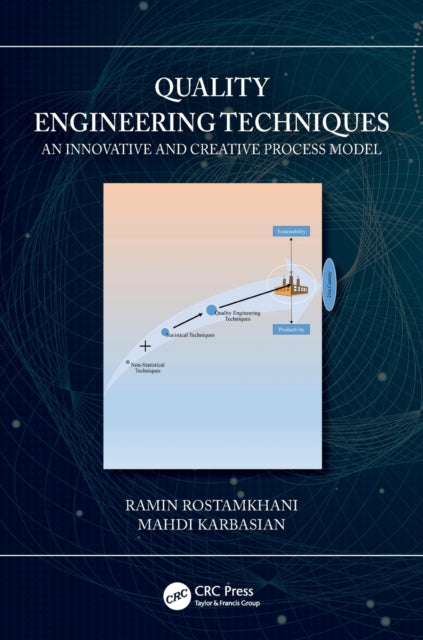RaminRostamkhani,MahdiKarbasian
Quality Engineering Techniques: An Innovative and Creative Process Model
Quality Engineering Techniques: An Innovative and Creative Process Model
YOU SAVE £2.35
- Condition: Brand new
- UK Delivery times: Usually arrives within 2 - 3 working days
- UK Shipping: Fee starts at £2.39. Subject to product weight & dimension
Bulk ordering. Want 15 or more copies? Get a personalised quote and bigger discounts. Learn more about bulk orders.
Couldn't load pickup availability
- More about Quality Engineering Techniques: An Innovative and Creative Process Model
Quality Engineering Techniques (QET) is a powerful tool for increasing productivity and sustainability in industries and firms of all sizes. This book will introduce the integrated model and numerical applications for implementing it.
Format: Paperback / softback
Length: 108 pages
Publication date: 01 February 2022
Publisher: Taylor & Francis Ltd
In the dynamic and intricate realm of today's industrial landscape, the pace of change is truly remarkable. The sheer volume of data that requires analysis is vast, while the available time for processing it continues to shrink. Across industries and organizations of all sizes, there is a relentless pursuit to enhance productivity and sustainability, crucial factors in maintaining a competitive edge in the ever-evolving marketplace. One of the most effective tools in achieving this goal is the application of Quality Engineering Techniques (QET). This comprehensive book aims to provide a thorough introduction to the integrated model and its numerical applications, empowering readers to harness the power of QET in their endeavors.
Quality engineering techniques (QET) play a pivotal role in the realm of industrial development. By integrating various scientific and engineering principles, QET aims to improve the quality of products, processes, and services. This involves the application of statistical methods, optimization techniques, and quality control principles to ensure that products meet or exceed customer expectations.
One of the key advantages of QET is its ability to reduce waste and defects. By identifying and eliminating sources of errors and inefficiencies, QET helps industries to minimize costs and improve their bottom line. This not only benefits the industry but also has a positive impact on the environment, as reduced waste and pollution contribute to a healthier and more sustainable society.
In addition to its cost-saving benefits, QET also enhances customer satisfaction. By delivering high-quality products and services, industries can build trust and loyalty with their customers, leading to increased sales and profitability. This, in turn, stimulates economic growth and creates job opportunities, benefiting both the industry and the broader community.
However, implementing QET can be challenging, as it requires a comprehensive understanding of the underlying principles and a commitment to continuous improvement. Industries must invest in training and development programs to ensure that their employees have the necessary skills and knowledge to apply QET effectively.
One of the key challenges in QET is the need to balance the demands of different stakeholders. While the focus on quality may be paramount for some customers, others may prioritize cost or speed. QET practitioners must work closely with stakeholders to identify their priorities and develop solutions that meet both their needs and the broader objectives of the industry.
Another challenge is the increasing complexity of modern industrial systems. With the advent of technology, industries are facing increasingly sophisticated challenges, such as cyber security, supply chain management, and environmental sustainability. QET practitioners must stay up-to-date with the latest developments and technologies to develop effective solutions that address these complex challenges.
Despite these challenges, QET remains a powerful tool for driving industrial development and improving the quality of products and services. By integrating scientific and engineering principles, QET helps industries to reduce waste, defects, and costs, while also enhancing customer satisfaction and stimulating economic growth.
In conclusion, the progress of change in the industrial and complex world is truly remarkable. The application of Quality Engineering Techniques (QET) is a crucial tool for achieving productivity and sustainability in the marketplace. By reducing waste and defects, enhancing customer satisfaction, and stimulating economic growth, QET plays a vital role in driving industrial development and improving the quality of products and services. However, implementing QET requires a comprehensive understanding of the underlying principles and a commitment to continuous improvement. By investing in training and development programs, industries can ensure that their employees have the necessary skills and knowledge to apply QET effectively, and by working closely with stakeholders, they can develop solutions that meet both their needs and the broader objectives of the industry. As the world continues to evolve, QET will remain an essential tool for driving industrial development and improving the quality of life for everyone.
Weight: 196g
Dimension: 156 x 235 x 13 (mm)
ISBN-13: 9780367500061
This item can be found in:
UK and International shipping information
UK and International shipping information
UK Delivery and returns information:
- Delivery within 2 - 3 days when ordering in the UK.
- Shipping fee for UK customers from £2.39. Fully tracked shipping service available.
- Returns policy: Return within 30 days of receipt for full refund.
International deliveries:
Shulph Ink now ships to Australia, Belgium, Canada, France, Germany, Ireland, Italy, India, Luxembourg Saudi Arabia, Singapore, Spain, Netherlands, New Zealand, United Arab Emirates, United States of America.
- Delivery times: within 5 - 10 days for international orders.
- Shipping fee: charges vary for overseas orders. Only tracked services are available for most international orders. Some countries have untracked shipping options.
- Customs charges: If ordering to addresses outside the United Kingdom, you may or may not incur additional customs and duties fees during local delivery.


